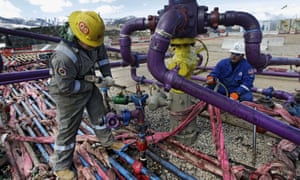In the first significant check on the Trump administration’s “energy-first” agenda, a US judge has temporarily halted hundreds of drilling projects for failing to take climate change into account.
Drilling had been stalled on more than 300,000 acres of public land in Wyoming after it was ruled the
Trump administration violated environmental laws by failing to consider greenhouse gas emissions. The federal judge has ordered the Bureau of Land Management (BLM), which manages US public lands and issues leases to the energy industry, to redo its analysis.
The decision stems from an environmental lawsuit. WildEarth Guardians, Physicians for Social Responsibility, and the Western Environmental Law Center sued the BLM in 2016 for failing to calculate and limit the amount of greenhouse gas emissions from future oil and gas projects.
The agency “did not adequately quantify the climate change impacts of oil and gas leasing”, said Rudolph Contreras, a US district judge in Washington DC, in a ruling late on Tuesday. He added that the agency “must consider the cumulative impact of GHG [greenhouse gas] emissions” generated by past, present and future BLM leases across the country.
The decision is the first significant check on the climate impact of the Trump administration’s “energy-first” agenda that has opened up vast swaths of public land for mining and drilling. Environmental advocates are praising the move, with Jeremy Nichols, WildEarth Guardians’ Climate and
EnergyProgram director, calling it a “triumph for our climate”.
“This ruling says that the entire oil & gas drilling program is off the rails, and moving forward illegally,” said Nichols.
The BLM did not reply to a request for comment. The Western Energy Alliance, one of the defendants in the case, also did not respond to a request. Kathleen Sgamma, its president,
told the Washington Post: “This judge has ignored decades of legal precedent in this ruling. The judge is basically asking BLM to take a wild guess on how many wells will be developed on leases, prematurely.”
Nichols predicts there will be implications for public lands across the west. His group is now poised to bring litigation to block drilling on hundreds of thousands of acres in other states.
“With the science mounting that we need to aggressively rein in greenhouse gases, this ruling is monumental,” said Kyle Tisdel, attorney and energy and communities program director for the Western Environmental Law Center. “Every acre of our public land sold to the oil and gas industry is another blow to the climate, making this ruling a powerful reality check on the Trump administration and a potent tool for reining in climate pollution.”
At this critical time…
… we can’t turn away from climate change. The Guardian’s environmental coverage reports the scientific facts, social consequences and political choices that are shaping the fate of our planet. As the world's leaders turn their backs on the environment, we are at a crisis point. Individual consumer choices are important, but we need collective action to achieve the systemic change that will really make a difference. Our pioneering and our fearless reporting on the environment can play a vital role in that. But we need our readers’ support.
More people are reading and supporting our independent, investigative reporting than ever before. And unlike many news organisations, we have chosen an approach that allows us to keep our journalism accessible to all, regardless of where they live or what they can afford.
The Guardian is editorially independent, meaning we set our own agenda. Our journalism is free from commercial bias and not influenced by billionaire owners, politicians or shareholders. No one edits our editor. No one steers our opinion. This is important as it enables us to give a voice to those less heard, challenge the powerful and hold them to account. It’s what makes us different to so many others in the media, at a time when factual, honest reporting is critical.
Every contribution we receive from readers like you, big or small, goes directly into funding our journalism. This support enables us to keep working as we do – but we must maintain and build on it for every year to come.

.png)




No comments:
Post a Comment